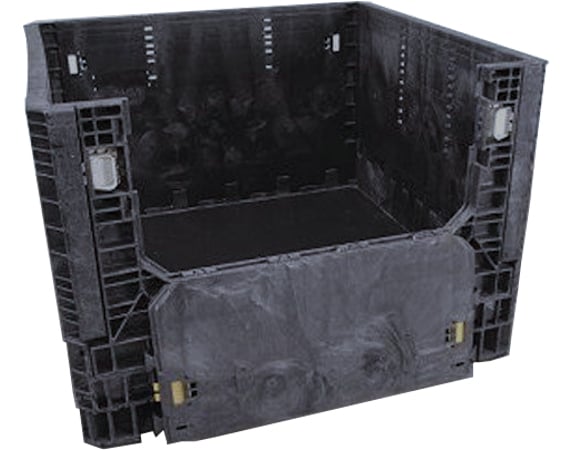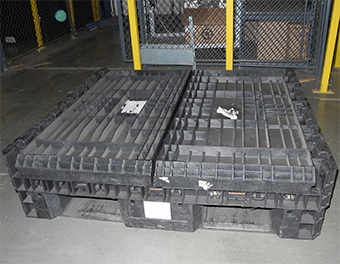Why used plastic containers are popular in food and manufacturing industries
Wiki Article
Why Mass Containers Are Important for Affordable and lasting Transportation
Bulk containers play an essential role in modern logistics. They help with the effective movement of big amounts of items, thereby optimizing transport procedures. This technique not only reduces expenses however additionally decreases environmental influence via reduced emissions and waste generation. As industries look for even more lasting methods, the fostering of mass containers is coming to be significantly considerable. What implications does this change hold for future logistics and supply chain monitoring?
The Benefits of Using Bulk Containers in Logistics
Bulk containers revolutionize logistics by improving effectiveness and sustainability. These containers enable the transport of large amounts of goods in a solitary trip, markedly lowering the variety of trips needed. This not only enhances procedures however likewise decreases labor expenses related to handling, packing, and unloading. On top of that, mass containers are designed to enhance area application within transport vehicles, guaranteeing that even more items can be delivered simultaneously.The standardization of bulk containers additionally streamlines the logistics procedure. With consistent measurements, they can be quickly stacked and saved, bring about boosted storage facility monitoring. Moreover, bulk containers often feature resilient materials that secure components from damage throughout transportation, consequently decreasing item loss and enhancing general dependability. Consequently, companies can experience enhanced supply chain performance, ultimately causing boosted productivity and client fulfillment. This combination of variables makes bulk containers a crucial property in contemporary logistics.
Ecological Effect: Lowering Waste and Carbon Impact
As markets progressively prioritize sustainability, the fostering of bulk containers has actually arised as an essential method for lowering waste and lowering carbon footprints. These containers decrease making use of packaging products, such as boxes and plastic, consequently notably decreasing overall waste generation. By settling deliveries, mass containers enhance transportation efficiency, permitting for even more items to be carried per trip. This reduction in journeys directly associates with reduced greenhouse gas exhausts, adding to a smaller carbon impact.Moreover, bulk containers can frequently be reused or reused, further mitigating ecological effect. The resilience of these containers warranties they can stand up to multiple transport cycles, lowering the requirement for single-use alternatives. used collapsible bulk containers. By improving logistics and promoting effective resource usage, bulk containers not only sustain sustainable techniques however likewise encourage industries to straighten with worldwide ecological goals. Ultimately, their execution reflects a dedication to ecological stewardship and responsible resource management
Expense Cost Savings: How Bulk Containers Lower Transport Costs
While lots of companies look for methods to improve their profits, using bulk containers provides a substantial opportunity for reducing transport expenditures. Mass containers make best use of the volume of products transported, allowing services to deliver larger amounts simultaneously. This performance reduces the variety of journeys required, directly reducing gas prices and minimizing labor costs connected with loading and dumping.Additionally, mass containers typically include structured styles that enhance room usage within transportation automobiles. This suggests fewer empty spaces, causing extra efficient use of available ability. Additionally, the durability of mass containers can reduce the threat of product damages during transportation, making certain and minimizing losses that even more products get here intact.
Enhancing Supply Chain Efficiency With Mass Storage Space Solutions
Bulk storage space services play an important duty in enhancing supply chain performance by optimizing stock monitoring. By combining products right into fewer, larger containers, services can greatly decrease dealing with prices connected with frequent transfers and processing. This structured approach enables far better tracking and management of stock, inevitably leading to boosted operational efficiency.Structured Supply Administration
Efficient stock management is necessary for optimizing supply chain procedures, especially when companies take on bulk storage space services. These solutions enable businesses to keep greater stock degrees while decreasing the regularity of replenishment. By settling materials into bulk containers, firms can improve their stock procedures, decreasing the intricacy related to tracking several smaller bundles. This method facilitates exact stock counts and boosts projecting accuracy, permitting more informed decision-making. Furthermore, bulk storage space options simplify stockroom company, making it much easier to find and accessibility products when required. Therefore, companies can attain a more reliable supply turn over rate, eventually enhancing general supply chain performance and minimizing the probability of stockouts or overstock circumstances.
Reduced Handling Expenses
The execution of bulk storage solutions not just streamlines stock management but additionally substantially lowers handling expenses across the supply chain. By consolidating products right into bulk containers, firms reduce the need for constant handling and transfer between get more info various storage and transport systems. This technique minimizes labor prices associated with loading, dumping, and moving smaller plans. Furthermore, mass storage reduces the frequency of deliveries, resulting in lower transport expenses and decreased gas consumption. Consequently, businesses can enhance their logistics procedures, allowing for a more reliable appropriation of sources. Eventually, reduced dealing with expenses contribute to enhanced general supply chain performance, cultivating an atmosphere that sustains both sustainability and economic practicality.
Versatility of Mass Containers Throughout Different Industries
Several markets have unique needs for transportation and storage space, bulk containers have emerged as a functional service that satisfies a broad range of requirements. These containers, ranging from large bins to specialized tanks, can accommodate varied materials, consisting of granules, liquids, and powders. In the agricultural sector, bulk containers facilitate the transportation of fertilizers and grains, while the food and beverage market uses them for ingredients and finished items. The chemical market depends on mass containers for safely transferring dangerous materials, making certain compliance with safety and security regulations. Additionally, building and construction firms gain from mass containers for transferring accumulations and other materials. Their adaptability prolongs to various settings of transport, including ships, trains, and trucks, improving logistical efficiency. This adaptability not just simplifies procedures across different fields yet additionally advertises sustainability by minimizing packaging waste and maximizing room in transit. Consequently, bulk containers play an essential duty in modern supply chain management.Future Trends wholesale Container Use and Sustainability
The future of mass container usage is progressively shaped by innovative products advancement that improves sustainability. In addition, automation in logistics assures to simplify operations, decreasing waste and boosting efficiency. Embracing circular economy methods will certainly additionally transform just how bulk containers are made, made use of, and recycled, cultivating an extra lasting transportation landscape.Innovative Products Growth
As markets significantly focus on sustainability, innovative products growth wholesale containers becomes a significant aspect in improving green transportation solutions. Manufacturers and scientists are checking out naturally degradable plastics, recycled composites, and light-weight steels to lower ecological effect. These materials not just decrease waste however additionally improve fuel efficiency by reducing the general weight of containers. Furthermore, advancements in clever products, which can adapt to varying problems, improve the sturdiness and functionality of bulk containers. The integration of these innovative products straightens with round economic situation principles, promoting reuse and recycling. As the demand for sustainable methods expands, the advancement of such products will certainly play a crucial role fit the future of bulk container usage in logistics and transportation.Automation in Logistics
Significant advancements in automation are poised to transform logistics and the use of bulk containers, enhancing sustainability in transportation. Automated systems, consisting of drones and independent lorries, are streamlining the activity of bulk containers, reducing the reliance on standard fuel-powered transport. These innovations maximize routing and packing procedures, enhancing and minimizing vacant miles fuel effectiveness. In addition, automated inventory administration systems enhance monitoring and surveillance of bulk containers, making sure better source allotment and decreased waste. The combination of the Internet of Things (IoT) allows real-time information evaluation, enabling proactive decision-making that lines up with sustainability goals. As automation remains to develop, it is anticipated to drive further innovations in mass container usage, eventually sustaining more lasting logistics methods and minimizing the environmental influence of transportation.Round Economic Situation Practices
Improvements in automation are establishing the stage for a more integrated approach to round economic climate practices in the domain of bulk container usage. As sectors increasingly accept sustainability, mass containers are being designed for durability and reusability. This shift not only minimizes waste however also enhances resource effectiveness. Companies are embracing approaches such as closed-loop systems, where made use of containers are gathered, refurbished, and reintroduced into the supply chain. Additionally, wise innovations track container life cycles, helping with far better administration and minimizing environmental effect. The collaboration in between producers, logistics service providers, and end-users is vital in developing requirements for lasting container usage. used collapsible bulk containers. Future patterns indicate a growing focus on products that are naturally degradable and recyclable, additional enhancing the round economic climate's principles wholesale transport
Frequently Asked Inquiries
What Materials Are Bulk Containers Usually Made From?
Bulk containers are generally created from sturdy products such as high-density polyethylene, cardboard, steel, and light weight aluminum. These products supply strength, versatility, and security, making them appropriate for moving different goods in various sectors efficiently.Exactly how Do I Choose the Right Dimension Bulk Container?
Picking the best size mass container involves evaluating the volume of materials to be transported, taking into consideration taking care of tools compatibility, and assessing storage area demands. Proper dimension guarantees effectiveness in transportation and lessens waste during delivery.Are Bulk Containers Reusable or Recyclable?
Bulk containers are typically reusable, created for several trips, enhancing sustainability. Numerous can additionally be recycled, depending upon the products utilized. Picking recyclable alternatives further supports ecological objectives and minimizes waste in transport methods.What Safety Regulations Put On Bulk Container Transport?
Safety and security regulations for mass container transport include conformity with the Department of Transport guidelines, appropriate labeling of unsafe products, architectural honesty evaluations, and adherence to weight restrictions to ensure secure handling and protect against crashes throughout transportation.Exactly How Can Businesses Transition to Using Mass Containers Effectively?
Organizations can transform to bulk containers by examining present logistics, training personnel on handling, purchasing appropriate equipment, enhancing stock administration, and teaming up with suppliers to guarantee compatibility and efficiency throughout the supply chain.
As industries progressively focus on sustainability, the adoption of bulk containers has actually emerged as a vital approach for decreasing waste and lowering carbon footprints. By settling products right into mass containers, business can simplify their stock processes, decreasing the intricacy linked with tracking multiple smaller bundles. As industries significantly focus on sustainability, ingenious materials advancement in bulk containers emerges as a considerable factor in boosting environment-friendly transport solutions. Automated systems, consisting of drones and autonomous vehicles, are simplifying the activity of bulk containers, minimizing the reliance on traditional fuel-powered transport. Additionally, automated supply administration systems enhance monitoring and surveillance of mass containers, ensuring better resource allocation and decreased waste.
Report this wiki page